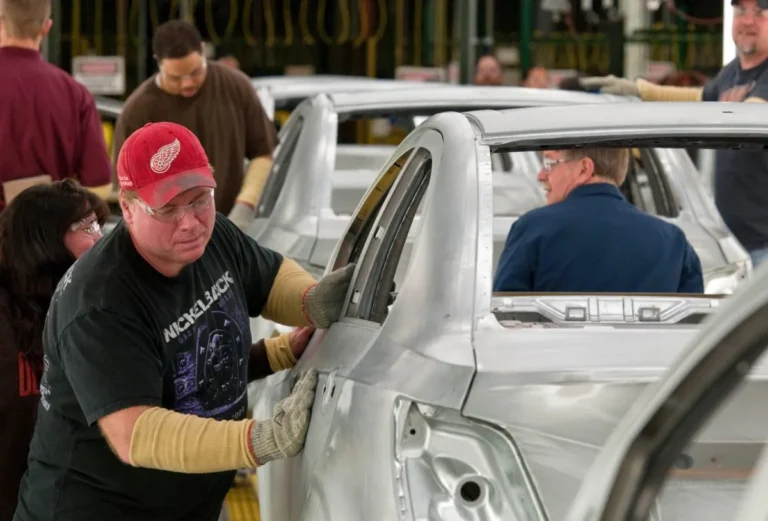Michigan auto workers are facing a difficult financial reality as major automakers announce reduced profit-sharing payouts. Rising production costs, persistent inflation, and declining new vehicle sales have squeezed industry profits, leading to lower bonuses for workers who have long relied on these payouts as a key component of their compensation.
The downturn isn’t just affecting auto workers—it’s also rippling through the broader economy, impacting car buyers, suppliers, and local communities that depend on the industry. The slowdown in new car sales is also driving down values in the used car market, making it more challenging for consumers looking for affordable vehicle options.
With the automotive sector facing multiple headwinds, workers and industry leaders alike are being forced to navigate an uncertain future.
Why This Matters
For decades, profit-sharing has been an essential part of compensation for unionized auto workers. Unlike traditional salary or hourly wages, profit-sharing bonuses provide employees with a direct financial stake in the success of the companies they work for. When times are good, these payouts can significantly boost workers’ earnings, helping them pay off debts, save for the future, or make major purchases.
However, when the industry struggles, those payouts shrink, leaving workers with less financial security. Many auto workers in Michigan have come to rely on these bonuses to help manage the rising costs of living. The current reduction in profit-sharing is therefore more than just a financial inconvenience—it’s a sign of deeper struggles within the industry.
Declining new vehicle sales are a major concern for automakers, particularly as they continue transitioning toward electric vehicles (EVs) while managing ongoing supply chain disruptions. The shift to EVs requires massive investments in new technology, manufacturing processes, and infrastructure, all while demand for traditional gasoline-powered vehicles remains uncertain. Consumers are also facing higher interest rates on auto loans, making it more expensive to buy both new and used cars.
The used car market, which saw record-high prices in recent years due to supply shortages, is now experiencing a slowdown as well. With fewer buyers willing to pay premium prices, resale values have dropped, making it harder for dealerships and individuals to turn a profit on used vehicles.
These factors combined have created a challenging environment for the entire auto industry, with ripple effects extending to workers, suppliers, and communities that depend on manufacturing jobs.
The Broader Economic Impact
Michigan has long been the heart of the U.S. auto industry, with thousands of workers directly employed by major automakers like General Motors, Ford, and Stellantis. The state’s economy is heavily tied to the success of the auto sector, and any downturn in the industry can have wide-reaching effects.
Lower profit-sharing payouts mean less disposable income for workers, which can lead to reduced consumer spending in local businesses, from restaurants and retail stores to real estate and entertainment. When auto workers have less to spend, the impact is felt throughout their communities, affecting everything from housing markets to small business revenues.
In addition, as automakers look for ways to cut costs, they may reduce production, delay investments, or even consider layoffs—moves that could further disrupt the economy. The uncertainty surrounding the future of the auto industry is creating anxiety among workers, many of whom have already endured job losses and plant closures in recent years.
What’s Next for Auto Workers and the Industry?
To navigate these challenges, automakers must find ways to balance cost-cutting measures with efforts to retain and motivate their workforce. Skilled labor is critical to maintaining productivity and innovation, and reducing financial incentives for workers could ultimately harm the industry’s long-term success.
One potential solution is for automakers to focus on improving efficiency through technology and process improvements. Automation and AI-driven manufacturing could help reduce costs while maintaining high production standards. However, increased automation also raises concerns about job security for human workers, making it essential for companies to find a balance between technological advancement and workforce stability.
Another factor to watch is how the transition to electric vehicles plays out in the coming years. While EVs represent the future of the automotive industry, the shift requires significant investment in battery production, charging infrastructure, and new supply chain relationships. If automakers can successfully navigate this transition while maintaining strong vehicle sales, they may be able to restore higher profit-sharing payouts in the future.
Additionally, labor unions and worker advocacy groups may push for new agreements that protect workers from significant fluctuations in profit-sharing payouts. The recent United Auto Workers (UAW) contract negotiations have already highlighted the need for more stable and predictable compensation structures. Future contract negotiations could focus on ensuring that workers receive fair wages and benefits, even during economic downturns.


